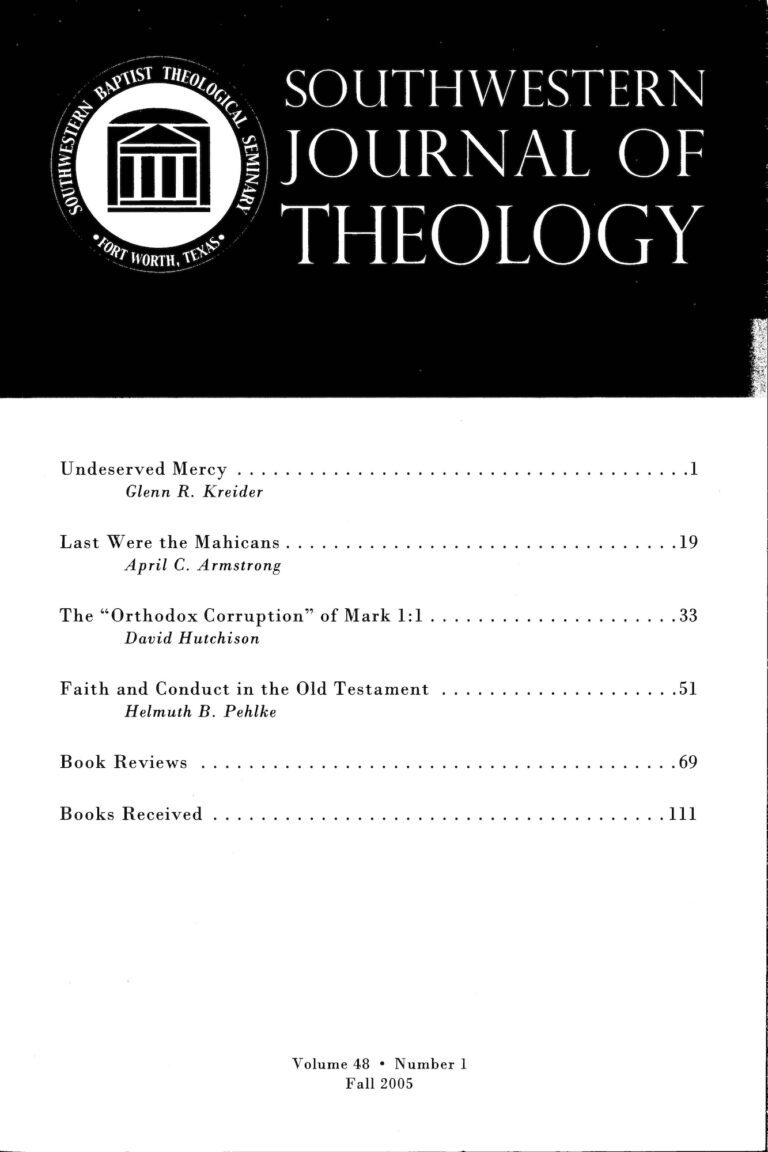
Southwestern Journal of Theology (48.1)
Southwestern Journal of Theology
Volume 48, No. 1 - Fall 2005
Editor: Paige Patterson
By Bruce A. Ware. Wheaton: Crossway, 2004. 241 pages. Softcover, $17.99.
Is God’s control of the events of this world exhaustive and meticulous? Is God’s control of good and evil symmetrical, or is God’s control of evilsomehow different from God’s control of good? If God does control all events in this world exhaustively and meticulously, then are humans responsible for their actions? These are just some of the questions that Bruce Ware poses at the outset of God’s Greater Glory.
While these questions might cause the reader to think that God’s Greater Glory is simply a work on Providence, in reality, Bruce Ware is concerned with presenting a complete picture of God’s relation to and involvement with the world. Interacting with traditions ranging from classical theism to Open Theism and Process Theology, Ware sets out to chart a course that he hopes will be more faithful to the scriptures than these other alternatives. For example, Ware rejects or redefines certain elements of classical theism, such as God’s timelessness and impassibility (chapter 5), which he believes fail to reflect accurately the loving and responsive God portrayed in scripture. Process theology and Open Theism are found to be both biblically and theologically inadequate explanations of God’s relationship to the world.
Ware’s position, which he characterizes as being within the “broad Reformed tradition” (63), shares many features with other Reformed works on this same subject. For example, he argues that humans have compatibilist freedom as opposed to libertarian freedom. He also argues that God exercises exhaustive and meticulous control over all events in creation, including the actions of God’s moral creatures.
It is when Ware departs from the Reformed tradition that we find the unique elements of his position. Readers will see this most clearly in Ware’s adoption of a “compatibilist middle knowledge” position (1 ISIS). God knows not only what his creatures will do in any situation but God also knows what we would do were our natures or situations different. With this knowledge God can bring about various influences in our lives such that we necessarily choose to act in the way that God intends. Ware’s middle knowledge position differs significantly from the traditional Molinist position in that Ware insists that the libertarian freedom on which Molinist middle knowledge is based proves to be untenable (112). However, the question whether Ware’s “compatibilist middle knowledge is truly middle knowledge is perhaps an issue yet to be fully resolved. Ware is aware of the question and offers a response to a recent charge that his position is not truly a middle knowledge position at all (115, n. 10).
God’s Greater Glory is a useful addition to the discussion of God’s overall relation to the world as well as the narrower issue of God’s providential governance of creation. The penetrating questions with which the book begins and the seriousness with which Ware treats them are reason enough to own this work. That being said, this reviewer must ask whether Ware has departed too quickly from certain commitments characteristic of classical theism. Are the objections to classical theism that are raised by Open Theists and Process Theologians truly objections to the classical tradition or are they objections to a caricature of that tradition? Ever since Adolf Von Harnack made the charge that much of the classical Christian tradition was little more than Greek metaphysics imposed upon the simple message of Jesus, classical theism has been the object of suspicion. This reviewer fears that that suspicion may be operative in Ware’s treatment of certain doctrines. To be fair, Ware clearly states that his first priority is to be biblical. However, his attitude towards classical theism seems to be based upon the assumption that those within the classical tradition were not equally interested in being biblical.
God’s Greater Glory is not an unbiased treatment of what has always been a controversial set of issues. However, one would have to look far and wide to find an unbiased book on this subject. As long as the reader is aware of the perspective from which Ware is arguing, God’s Greater Glory will prove to be a useful addition to his or her library.





